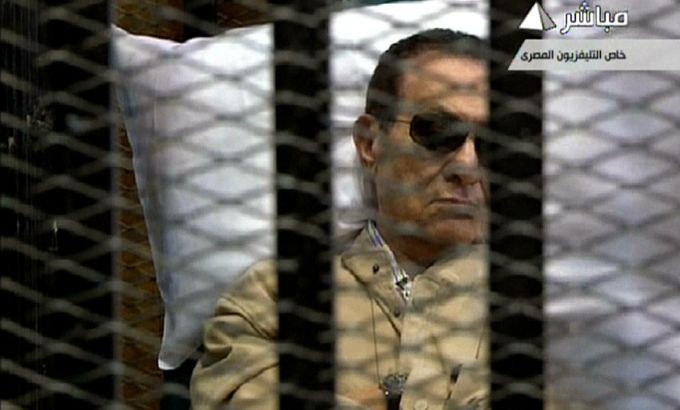Mubarak receives life term for protest deaths
Egypt’s ex-president and his interior minister sentenced to life while his sons and six other officials are acquitted.

An Egyptian court has sentenced former president Hosni Mubarak to life in prison after convicting him of involvement
in the murder of protesters during the uprising that toppled him last year.
Also given a life term on Saturday was Mubarak’s former interior minister Habib el-Adly, while six former police commanders were acquitted.
Meanwhile, corruption charges against Mubarak’s sons, Alaa and Gamal, were dropped.
Mubarak, the first Arab leader to be tried by his own people since the wave of uprising began in Tunisia in late 2010, was found guilty for permitting the killing at least 800 protesters during the 18-day revolt that overthrew him on February 11, 2011.
The 84-year-old Mubarak was then ferried in a helicopter away from the police academy that was used as the courtroom in Cairo.
Hossam Baghat, an attorney from the Egyptian Initiative for Personal Rights, told Al Jazeera that the verdict was likely to be appealed.
 |
| Interactive: Egypt’s ex-regime on trial |
“This trial is far, far from over,” said Baghat, adding the the trial was inadequate.
Al Jazeera’s Sherine Tadros, reporting from outside the court, said that the decisions left the situation regarding Mubarak’s actual culpability somewhat unclear.
“A lot of people are now talking about how easy it will be to appeal these life sentences, because at the end of the day, it looks more like a political decision than one based on legal merit.
“The fact that you had these senior aides [from the interior ministry] that were on trial acquitted, means that the actual link of giving those orders to kill the protesters to the police officers, that actually was not found”
The charges against Gamal and Alaa Mubarak were dropped with the judge saying “the case had lapsed” because the alleged crime took place over 10 years ago.
Alaa and Gamal, who were being tried alongside their father for corruption, were facing sentences of up to three years in prison, according to Human Rights Watch.
‘Thirty years of darkness’
Judge Ahmed Refaat delivered a strongly worded statement before handing down the sentences. Mubarak, who wore sunglasses and a light brown jacket over his clothes, and his co-defendants were in an iron cage.
| Verdicts and sentences: | |||||||||||
|
Refaat described Mubarak’s era as “30 years of darkness” and “a darkened nightmare” that ended only when Egyptians rose up to demand change.
“They peacefully demanded democracy from rulers who held tight grip on power,” the judge said.
Refaat, who was presiding over his last court session before he retires, said Mubarak and el-Adly did not act to stop the killings during 18-day days of mass protests that were met by a deadly crackdown of security forces on unarmed demonstrators.
Relatives of those killed in the uprising gathered at Tahrir Square to hear the sentence said they did not expect the sentence to deter future abuses of power.
“I doubt that the penalty given to Mubarak will be a deterrent. Everything that has happened during the transitional period does not inspire much trust in the future,” said Mohammed Khaled, whose brother was killed during the uprising.
“It was like a sarcastic play and this happened also during the presidential elections, we do not trust anything issued by the military council or the judiciary which is corrupt.”
More than 850 protesters were killed, most shot to death, in Cairo and other major cities.
Military’s role
Egypt has been ruled by the military since Mubarak was forced to resign last year, after 18 days of nationwide protests.
Al Jazeera’s Jamal Elshayyal, reporting from Alexandria, said there is “strong dissatisfaction” regarding today’s verdicts.
“Up until today’s trial, every single police officer who was charged with killing a protester was acquitted, and now, their superiors in the interior ministry were also acquitted; also the minister, also the president were acquitted of giving order to kill…the question is, who gave those orders?”
Mubarak has been detained at a hospital in the resort town of Sharm el-Sheikh since his arrest last year, after the military appeared to bow to protesters demands that he and former regime officials be put on trial.
But the military insists the prosecution’s investigations and the charges eventually filed were independent judicial decisions.
Critics say the investigations were hasty and sloppy, however, resulting in a trial based on patchwork evidence that may see Mubarak acquitted on appeal.
During the trial, Mubarak was wheeled into the lecture hall that serves as a courtroom on a stretcher. He reportedly suffers from a heart condition, but the health ministry has denied his lawyer’s claim that he has cancer.
The six former police commanders who were acquitted have all denied that they ordered police to shoot protesters or use deadly force during the uprising, in which demonstrators torched police stations across the country.
Presidential race
Mubarak’s verdict came just days after presidential elections have been trimmed down to a June 16-17 contest between Mubarak’s last prime minister, one-time protégé Ahmed Shafiq, and Mubarak’s top foe, the Muslim Brotherhood leader Mohammed Morsi.
Following the verdict, Shafiq said that the decision proved that “no-one is above questioning if the law requires it”.
The Muslim Brotherhood, meanwhile, has announced that it will be joining protests against the verdict, terming it a “shocking” decision for the families of those killed during the revolution.
